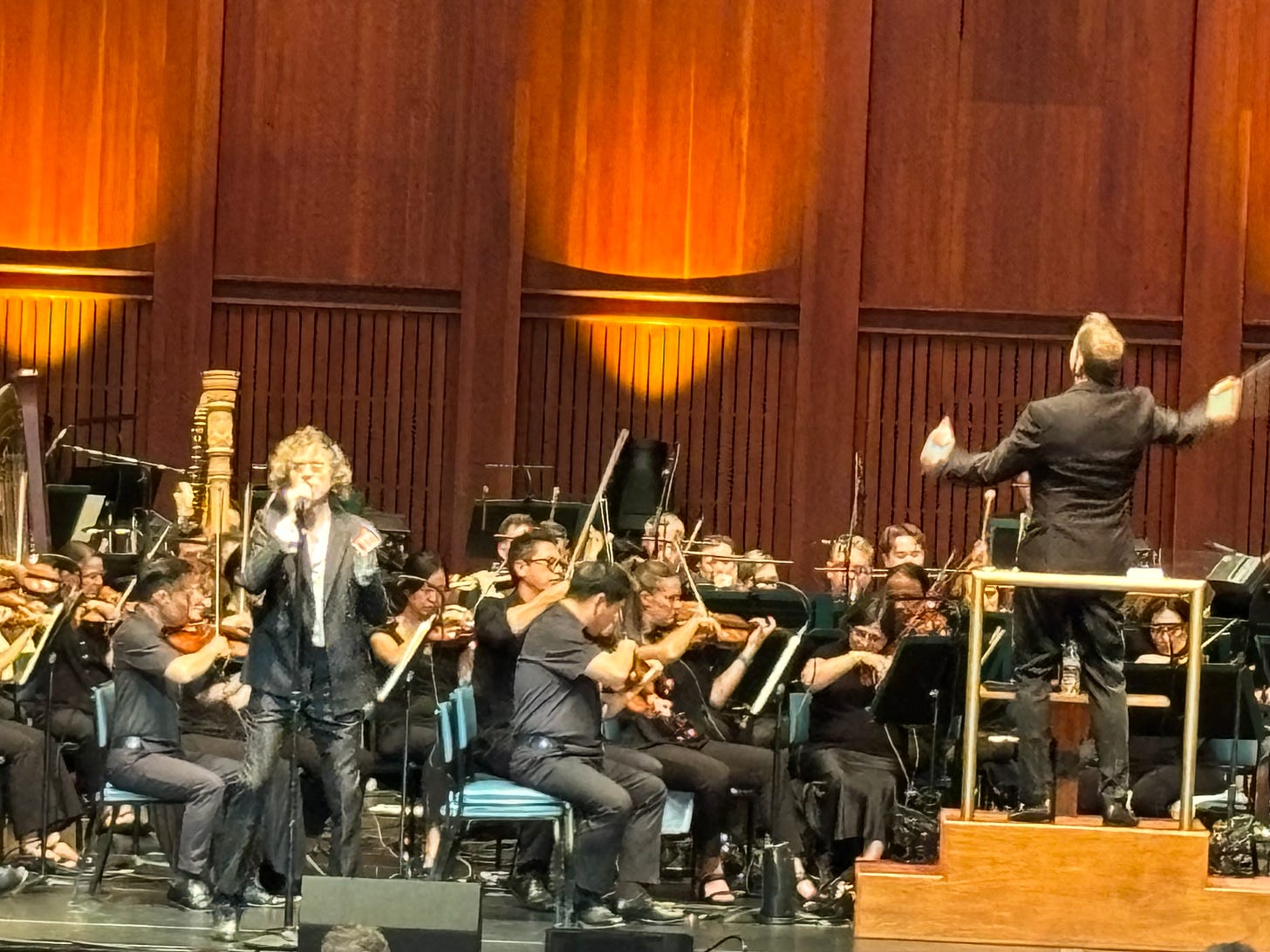Beck Joins the National Symphony
Finally, a tour that showcases work from 'Morning Phase' and 'Sea Change'
Where it’s at, Beck famously declared nearly three decades ago, was two turntables and a microphone.
But in his long and inventive career, he’s dabbled in a number of musical genres, and for his current summer tour he’s backed by much more than that DJ setup to perform in front of his own band and full 80-piece orchestras.
It’s a rich and rare opportunity to hear him do justice to a couple of his best received albums this century, the contemplative and orchestral 2014 Morning Phase and its thematic predecessor Sea Change from a dozen years earlier. The sweeping swells of strings that accompanied his ballads of heartbreak and isolation were finally being given the full backing they deserved.
Saturday night at Wolf Trap, the full National Symphony Orchestra set the tone with the brief instrumental “Cycle” before Beck strolled on with an acoustic guitar to begin “Morning” just as he did on the 2014 album. Wearing a dark suit over an unbuttoned white shirt, the ever-youthful Beck bounded around the stage when he didn’t stand stock-still at the microphone. His supple voice was well-mixed over the waves of music supporting him, intoning the deepened lyric turns from a guy once known only for his slacker stance.
In all, he played nearly a dozen songs from Morning Phase and Sea Change. The orchestral undertow didn’t just work for songs from those two melancholy albums, though. He had dabbled with the sounds on many of his other albums, if only through samples, so was eager to bring them to the stage for in some cases, the first time. That was the case with “Missing,” from his 2005 Guero, and the ballad “We Live Again” from 1998’s Mutations. But even “Tropicalia” from that 1998 album got a sprightly reading—and much needed change of pace, from the NSO. “We’ll bring the tragedy back in a little bit,” Beck deadpanned.
Orchestral arrangements have always been part of the artist’s DNA; his father David Campbell, an accomplished arranger and conductor with a long resume of film and pop music assignments, has done orchestral arrangements for many of Beck’s albums. But the setup also allowed Beck to indulge in saluting some of his biggest influences in pop baroque, particularly Scott Walker, the former member of the Walker Brothers of “The Sun Ain’t Gonna Shine Anymore” fame, who moved from America to the UK in the 1960s and recorded a string of more avant garde orchestral pop.
Beck did two of these—“It’s Raining Today” and “Montague Terrace (in Blue)” from Walker. And while he didn’t exactly cover another European baroque pop darling—Françiose Hardy, who died last month at 80—he dedicated his “We Live Again” to her. A couple of the songs Beck has done for films worked well in the format, especially his haunting reading of The Korgis’ “Everybody’s Got to Learn Sometime” from Eternal Sunshine of the Spotless Mind, and his cover of “Tarantula” for the 2019 Roma.
The tone of the concert was different from a normal rock show—there were no lighting effects or shifts whatsoever. Sometimes Beck walked off stage between songs to get a drink or put on a guitar. For the second of the brief instrumentals from Morning Phase, he left the stage altogether in the hands of NSO conductor Steven Reineke. Beck marveled that the NSO had learned the show in 90 minutes, but didn’t mention the symphony’s extensive schedule at Wolf Trap in recent days, in which they played an Opera, backed the rapper Nas, and played the scores of Harry Potter and Ghostbusters movies.
This night they gave him all the orchestral support he ever wanted and helped create a unique opportunity for fans to hear these songs as they’ve never been done on previous tours. He admitted it was all somewhat of a personal indulgence—“$1,000 karaoke,” he said. But listeners certainly benefited.
He occasionally dipped into more familiar ground, as in the middle of the set, there was something like “The New Pollution,” whose fussy instrumentation in the studio was largely due to the Dust Brothers’ programming. And to end the main set was the explosive “Where It’s At.”
Once the orchestra had cleared out, and Beck had wandered the vast stage of empty chairs (“Wow, 80 to zero in a minute”) he put up his harmonica for a busking “One Foot in the Grave” from his second album 30 years ago, and then to the sizzling alt-rock his fans craved: “Devil’s Haircut,” “Mixed Bizness” and finally, “Loser”—both his signature song and one that his success has long since disavowed.
This review originally appeared in The Vinyl District.




